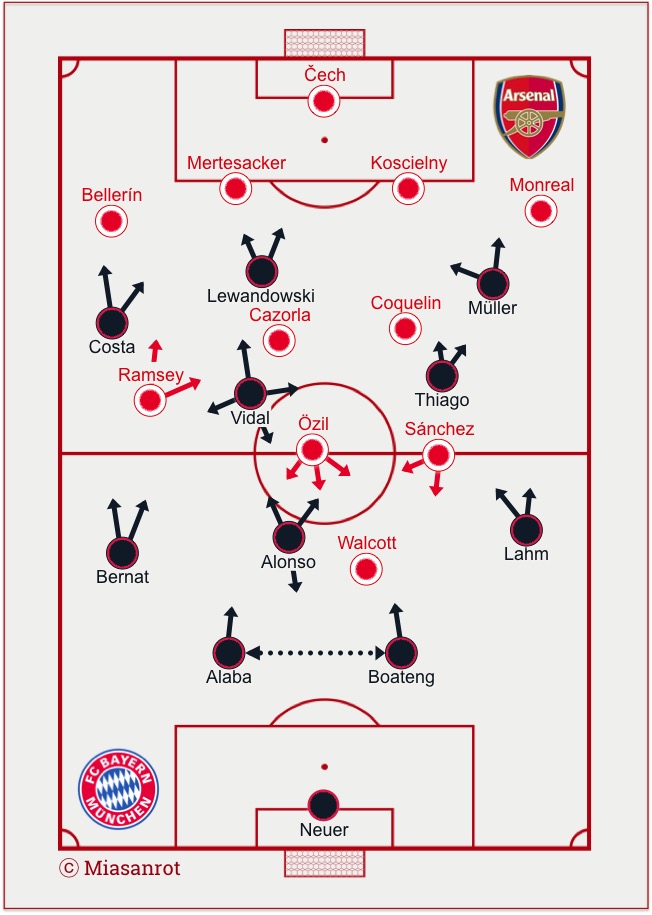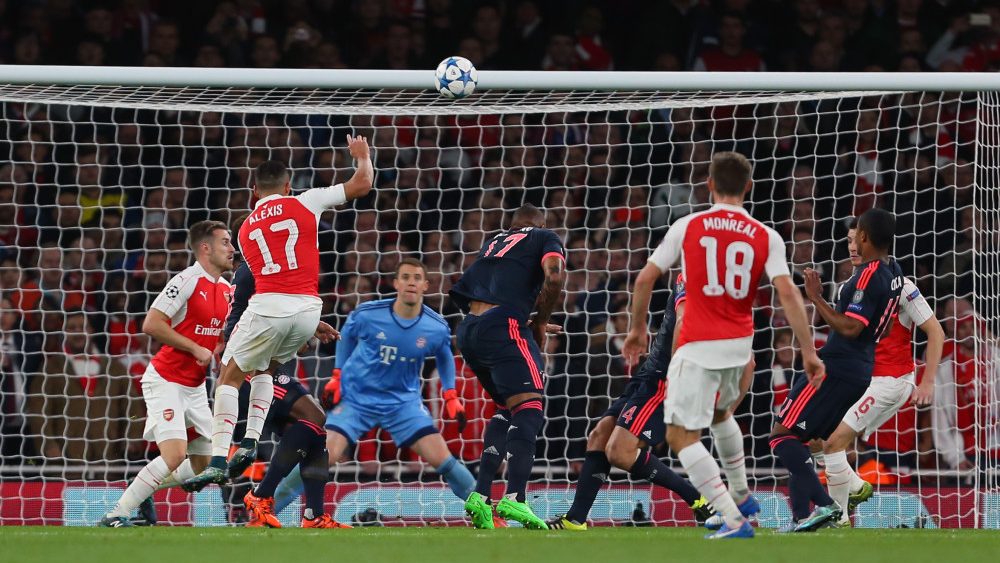Match Analysis: Arsenal FC – FC Bayern München 2-0 (0-0)
Arsenal started this year’s Champions League with two losses. The Wenger team had lost against Piraeus as well as against Zagreb, before they could report back with a win against Munich.
 Arsenal waited for counter-attacks in a system close to a 4-3-2-1, while Bayern chose the proven 4-1-4-1.
Arsenal waited for counter-attacks in a system close to a 4-3-2-1, while Bayern chose the proven 4-1-4-1.3 things we noticed:
1. A loss caused by individual mistakes
The first real loss in a competitive match this season. A welcome wakening call for many in the Bayern Munich sphere. It is by no means natural or expected that Bayern charge through the season without any mistakes or losses. The game at Arsenal showed just how sensible and vulnerable the normally outstanding structures of FC Bayern are. They didn’t play badly against a focused and strong opponent. On the contrary, a 1-1 would have been more reflective of the performance over the entire 90 minutes. If they had had more luck in terms of finishing, they could have scored the first goal – and we would have seen a different game.
At the end it was the individual mistakes that cost Bayern the game. Neuer with his faux pas for the 0-1 and Alaba’s bad pass which led to the 0:2. Theo Walcott’s big chance, saved by Neuer in an incredibly “kahn-esque” way, was caused by two positional errors in center by Lahm and Alaba.
This game showed that Bayern Munich isn’t as unbeatable as the papers suggested, and by no means are Robben and Ribéry no longer required. On this high level, concentration and determination in key situations are decisive. Additionally, Bayern were reminded that they still have problems with teams who commit few mistakes, offer compact defensive lines and execute rapid counter attacks.
For the first time, the team had to suffer a setback. The Bundesliga starting record and the good mood are forgotten, which does not have to be a bad thing. New stimuli and new tension could not only help the players but the entire club.
2. Problems with the defending of counter attacks
With high-positioned midfielders and the loss of a second defensive midfielder, problems with defending counter attacks have occurred regularly over the last three seasons since Guardiola’s debut. By choosing Walcott instead of Giroud, Wenger showed that this was his game plan. Arsenal, who needed three points, paradoxically fell back deeply and waited for opportunities to go for a counter-attack.
Although Bayern limited that risk by using defensive full-backs, the high positioning of Thiago and Vidal left lots of spaces for counter attacks. Even though they prevented easy turnovers in central midfield, with the exception of the second goal, they lost the ball too many times when trying to enter the box. Douglas Costa was a prime example for those mistakes.
All this shouldn’t be a problem as long as the counter pressing works. A quick grasp on the opponent after turnovers should be a positive side effect of highly positioned central midfielder.
It didn’t work against Arsenal. Especially Coquelin was able to evade Bayern’s pressure and start counter attacks with passes to his attacking teammates. They didn’t score through counter attacks but were able to exploit the vulnerable space around Alonso.
The game showed that Arturo Vidal isn’t in the form that’s required in order for him to be the fighter and ball chaser who makes Alonso’s life easier. Two successful tackles and two interceptions are poor numbers. Several times he was either too late or positioned wrongly.
Thiago, who won the ball more often than Vidal, didn’t seem to be robust enough to win the ball back quickly.
Arsenal were the best counter attacking team Bayern have faced so far. Not only because of Walcott, always on the edge of an offside position, but also because of Cazorla, Coquelin and Özil, highly skilled midfielders who always found a solution against Bayern’s counter pressing.
Guardiola needs to draw the necessary lessons. Over the course of the season, more games like that will take place. And for such situations we’ve got the perfect player in Arturo Vidal.
In the end, the right balance when pushing forward against defensive teams is key to success. Philipp Lahm told the media after the game that in many situations the players had been just too far up the pitch – which tells us that this wasn’t really planned. This issue will continue to keep us busy.
3. Guardiola’s plan with Lewandowski
Guardiola’s plan with Lewandowski, just exiting his incredible scoring run, was already evident before the game when the striker told the media he did not have to score every game to please the coach: “Sometimes my movements are more important. Especially the use of open spaces.”
Robert Lewandowski played a very active game and showed lots of intelligent movement and actions. Time and time again he occupied the left wing.
The plan was to confront the tall but slow center backs, Mertesacker and Koscielny, with the pace of the attacking players (Müller, Thiago, Vidal, Costa and Lewandowski) instead of employing a classic striker around the box. Lewandowski created space for others and was even willing to attack from the wing with the ball on his foot.
Two of the four good scoring chances were created that way. The fast one-two between Müller and Thiago in minute 10 was a prime example. A later chance for Vidal was only made possible by Lewandowski’s movement that opened up the space. Cech prevented the 0-1.
At the same time, Bayern were able to overload the half space on the left to challenge Bellerin. Bayern wanted to avoid high crosses because of Arsenal’s superiority in the air, which is the explanation for Costa’s frequent hard and flat attempts. At half time, Lewandowski had already registered 27 touches and had played 17 passes. His season average over 90 minutes is 20 passes.
After the break, Lewandowski had more problems with the described movements. Arsenal were even more defensive and closed possible passing routes. Guardiola reacted by switching Müller and Costa in order to enable different movement patterns, a move that turned out not to be a great success. Bayern took 21 shots, 9 inside the box, which isn’t a bad number. Lewandowski had a big chance to score a goal just before Bayern conceded – but they failed to create more real scoring chances in the second half.
Evidence for a strong defensive showing by Arsenal – despite a good Bayern game plan.
| ARSENAL FC – FC BAYERN 2-0 (0-0) | |
|---|---|
| Arsenal FC | Cech – Bellerin, Mertesacker, Koscielny, Monreal – Santi Cazorla, Coquelin – Ramsey (57. Oxlade-Chamberlain), Özil, Alexis Sanchez (82. Gibbs)- Walcott (74. Giroud) |
| Subs | Macey, Debuchy, Gibbs, Arteta, Giroud, Oxlaide-Chamberlain, Chambers |
| FC Bayern | Neuer – Lahm, Boateng, Martínez, Alaba – Xabi Alonso (71. Kimmich) – Vidal (71. Rafinha), Thiago – Müller, Lewandowski, Douglas Costa |
| Subs | Ulreich, Martínez, Kirchhoff, Gaudino, Coman |
| Goals | 1-0 Giroud (77.), 2-0 Özil (90.+3) |
| Cards | Yellow: Giroud / – |
| Referee | Cüneyt Çakir (Turkey) |
| Attendance | 59.824 (sold out) |





